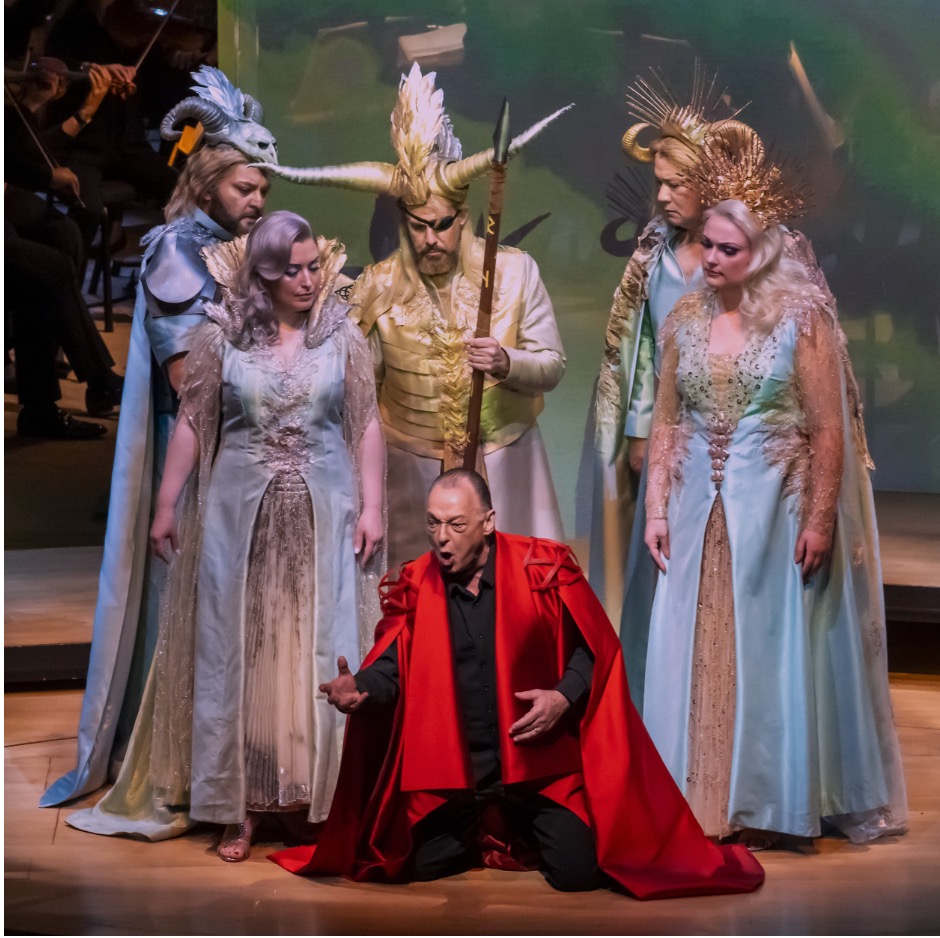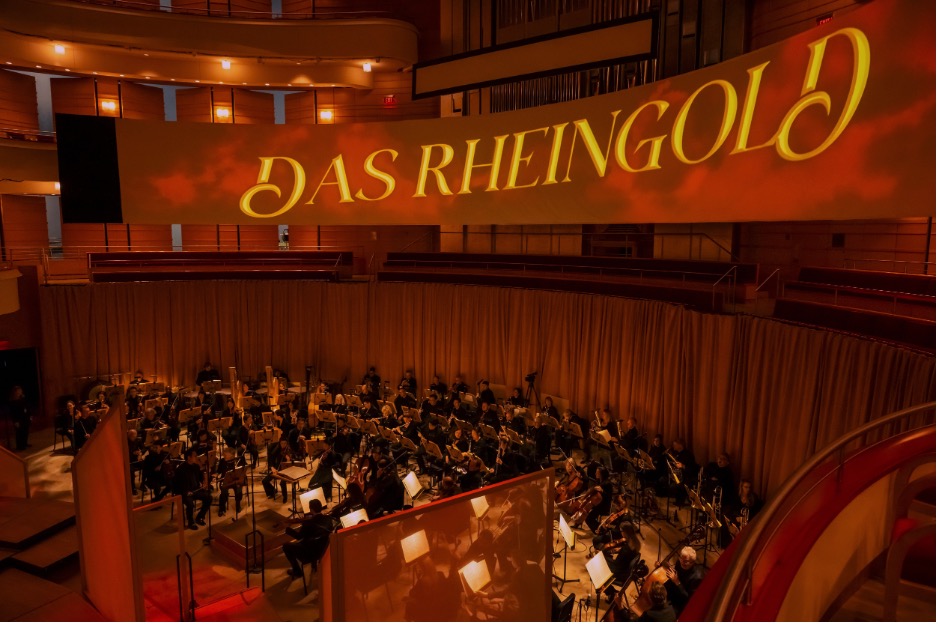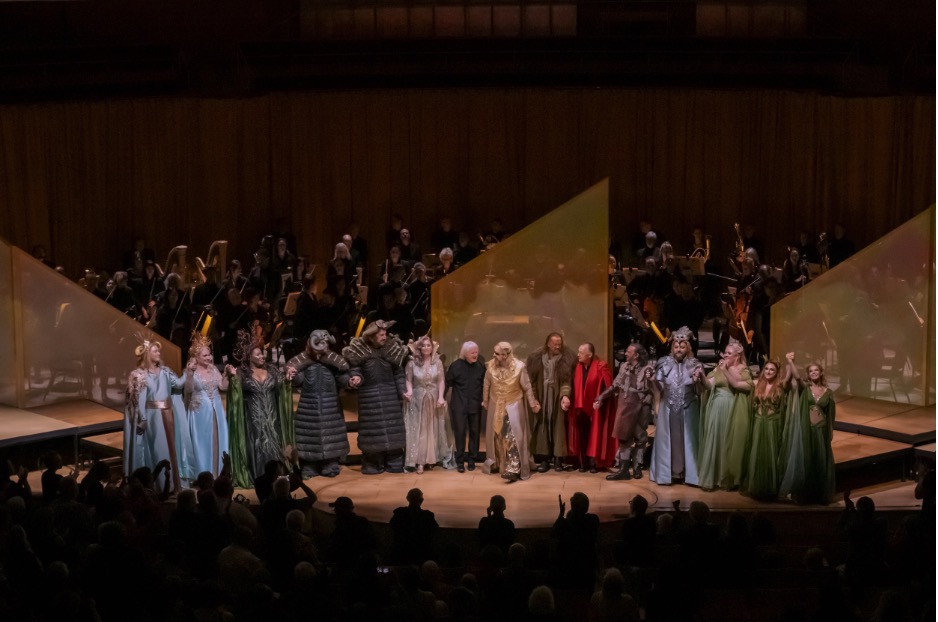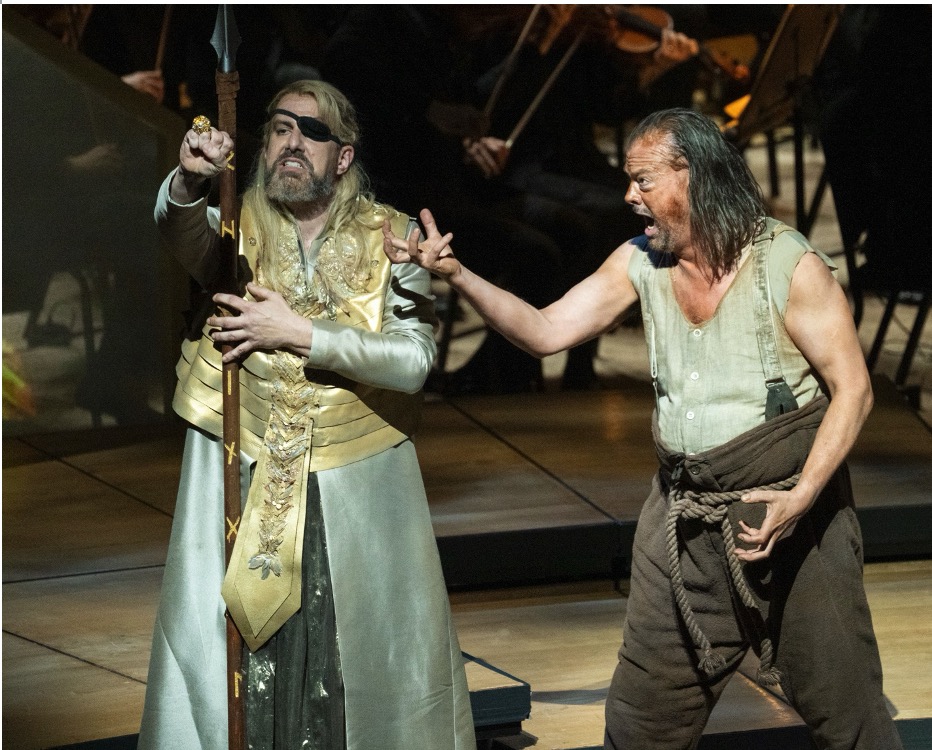Comments
GELFAND’S WORLD - The Ring operas written by Richard Wagner are still drawing audiences at this one-hundred-fifty year point in their existence. None other than George Bernard Shaw wrote a book about the Ring (The Perfect Wagnerite) and by now there are whole shelves full of Wagner commentary in the libraries of the world. So what's left to talk about? It turns out that there is. In particular, the Pacific Symphony has essayed their own go at the first of the Ring operas, Das Rheingold. Cutting to the chase, it was a triumph and a revelation, at least to a lot of Orange County audience members, and it was a delight to those who had already seen it before.
Let's begin with two or three sentences of explication to allow me to make a point about the Ring and our modern world.
"Falsch und feig ist was dort oben sich freut!"
This is one of the last lines in the whole work, sung from offstage by the same three women who begin the opera, and it roughly translates as the following:
"False and cowardly are all who revel above!"

Aleksey Bogdanov, Donner; Renée Tatum, Fricka; Kyle Albertson
And they are talking about the very same gods who rule the world and enjoy in its plunder, including the god Wotan, who will develop into a truly tragic figure as early as the second Ring opera. To this observer, Wagner's view of the ruling class has a special resonance with the situation in our country at this moment. Das Rheingold is an allegory on human nature (among other things) and it is sadly prescient. But let's continue regarding the artistic merits.
The Ring is three long works (Die Walkure, Siegfried, and Gotterdammerung) and a shorter prelude -- Das Rheingold -- which goes for a mere two and a quarter hours. The original vision was that Rheingold would be performed on one night, and the three longer operas would be performed on successive days, or at least every other day. The Ring was even described by its composer as a festival play. So what is it about?
Well, it's about human striving and emotion and our shortfalls as displayed by the gods themselves. They are greedy and lustful and loving and needful. The whole story begins with an act of greedy lust by the dwarf named Alberich, and this sets off a chain of events that ultimately leads -- through the doings of Wotan, the king of the gods -- to the ultimate destruction of the world order and of the gods themselves.
As opera goes, it isn't about a pretty woman dying of tuberculosis or the petty squabbles of the upper class (the subject of many of the most popular operas). It contains magic and heroism and the slaying of a dragon onstage.
But the reason people still go back is the music, both orchestral and voice. It takes both, and the voices that can do Wagner and undergo the training to do so are rare in this world. So there is (or at least has been) a feeling that only the biggest, richest opera houses can essay the Ring in its majesty. One thinks of the Metropolitan, or Chicago or San Francisco, at least in this country.
But there has been an increasing presence of the Ring in smaller and less wealthy venues. And now comes the Pacific Symphony, housed at the Renee and Henry Segerstrom Concert Hall in Orange County, doing its own Rheingold.

Pacific Symphony performs Das Rheingold
It turns out that it is possible for a mid-sized company to do Rheingold, in the sense that the orchestra, led by Carl St. Clair had what it takes, and it was possible to assemble a cast of singers who were, in large part, outstanding. It may be that some of this success is due to the fact that the hall itself is modestly sized by concert hall standards (it holds just over 1700 people) which allows the audience to hear details and subtlety and to feel the emotion of the parts where the singers and the orchestra go full volume.
In this performance, Nathan Berg sang the role of the angry dwarf Alberich (the name Alberich is pronounced with the accent on the first syllable). He is an accomplished singer with a resume that includes the Met and the Boston Symphony along with Theater Basel. He had not only the big voice but the actor's moves so as to bring the character to life. His Alberich brought to life the anxt and suffering of this ordinary fellow who has found himself caught up in the machinations of the mighty ones above. This is what I mean by saying that this performance, in this intimate venue, was a revelation. Berg received a well deserved standing ovation.
The rest of the cast members were nearly as good.

Das Rheingold cast with Pacific Symphony
Kyle Albertson sang the role of Wotan, the king of the gods, with the right kind of sound. Like the other members of this cast, he has a marvelous voice, but on this night singing without the volume that one has usually come to expect from others who have undertaken this challenge. He was particularly effective in a scene near the end when he is warned by none other than the earth goddess herself, and he has to make a decision (to give up the cursed ring) or face immediate destruction.

Bass baritone Kyle Albertson (Wotan)
Hanna Brammer as Woglinde has the looks of a tv star, so when she began to sing her part as a Wagnerian soprano, it was a wonderful effect.
All the rest of the cast members were effective and sounded great, with particular emphasis on Renee Tatum as Fricka, Teresa Perrotta as Freia, and Dennis Petersen as the crafty and cynical demigod Loge, and including Krysty Swann as Flosshilde, and Alexandra Razskazoff as Wellgunde.
In keeping with a trend we have been noticing -- particularly since the end of the pandemic -- American opera houses have been featuring singers who were born in this country and trained here. They come from programs at Indiana University and Juilliard and the Los Angeles Opera program, and they are developing as a national and international resource.
I became aware of this production, strangely enough, due to a television news story, which was a bit confusing and played up the Wagnerian origins of Tolkien’s novels (not to mention the movies) while featuring images of the players in their performance costumes. It was just barely enough to catch my interest, but it worked.
This production has used a couple of gimmicks. The first is that the Pacific Symphony has appended the words Curse of the Ring to the title, so that the ticket reads Curse of the Ring: Das Rheingold. No harm, no foul, as they say, but it would have been nice to know that it was really the opera and not some derivative form. In addition, this production added an intermission, which is a change from the way the story is traditionally performed in its full two hours plus. I don't think this does any harm. To the contrary, it allows the audience to come to the finale with a little bit of strength and wakefulness. Considering that Das Rheingold is built on four distinct scenes, it was easy enough to engineer a break between the second and third scenes.
In conversation with the fellow sitting next to me and with a professional musician who was also in attendance, it became clear that everyone noted and appreciated the voices. I should point out that these people have viewed and studied the Ring, and it was interesting to see that experts had much the same reaction as your humble View from the Balcony writer.
Carl St. Claire is retiring from a 35 year run as conductor of the Pacific Symphony, but we should be able to expect good things from his replacement. And in particular, we can hope that this group will do more opera performances in coming years.
Photo credit: Curse of the Ring photos by Doug Gifford.
(Bob Gelfand writes on science, culture, and politics for CityWatch. He can be reached at [email protected])






